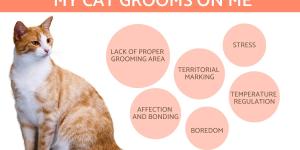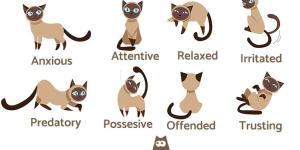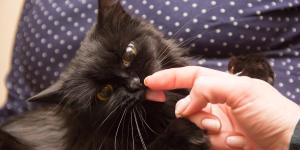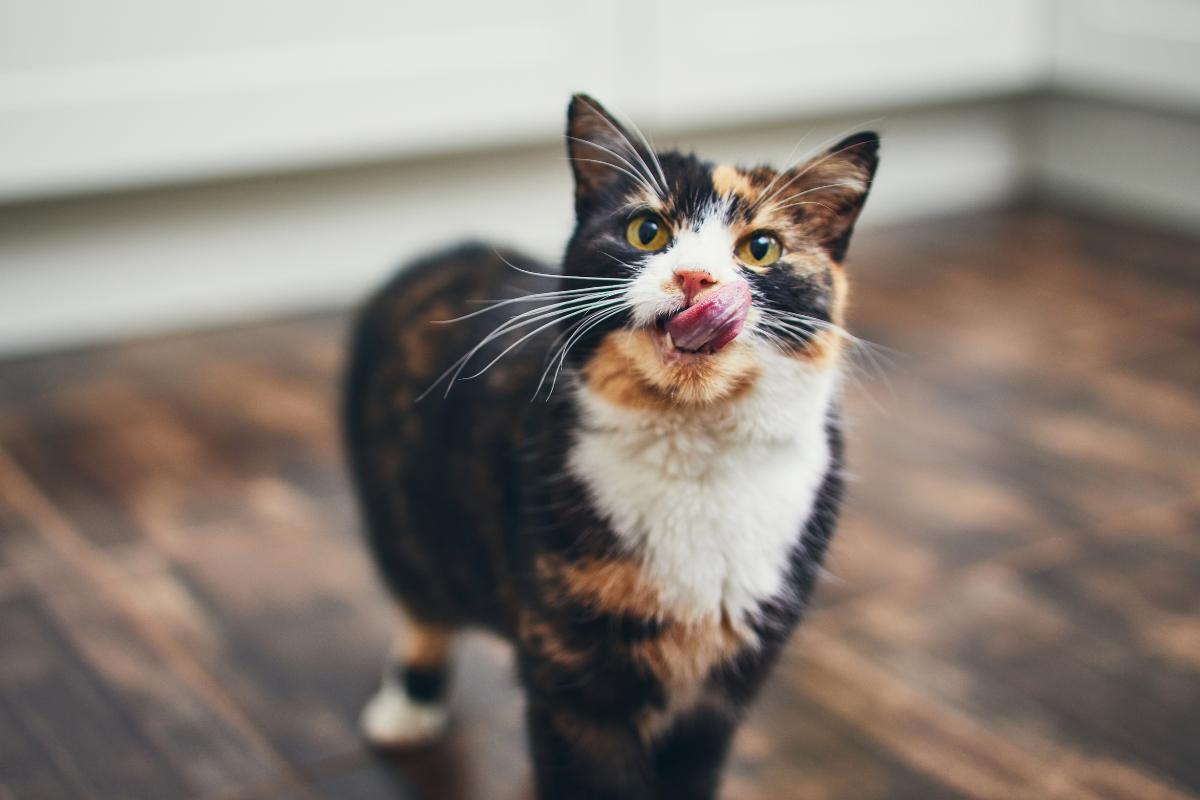My Cat Keeps Drooling - Causes and Treatment



See files for Cats
Cats drool for various reasons, including both benign and potential health-related causes. Drooling in cats can be triggered by contentment and relaxation, where they enter a state of deep satisfaction. Excitement or anticipation can also lead to drooling, especially when they are eagerly awaiting something they enjoy, such as mealtime or playtime. Cats may drool as a natural response to regulate body temperature in hot weather, using it as a means to cool down. However, drooling can also indicate underlying issues. Some of these issues can be sufficiently serious to threaten their health and wellbeing.
At AnimalWised, we look at some of the reasons why my cat keeps drooling. The causes and treatment of persistent drooling in cats are varied, so we need to look at the context of the symptom and determine whether it requires veterinary consultation.
Ingestion of poison
Poisoning in cats can cause drooling as a result of several factors related to the toxic substances ingested. When a cat consumes a toxic substance, it can lead to irritation, inflammation, or damage to the gastrointestinal tract, mouth, or throat, triggering excessive salivation and drooling. Here are some reasons why poisoning can cause drooling in cats:
- Direct irritation: certain toxins, such as household cleaning products, chemicals, or plant toxins, can directly irritate the mouth, tongue, or throat lining, leading to increased saliva production and drooling.
- Nausea and gastrointestinal distress: many toxic substances can cause gastrointestinal upset, including nausea, vomiting, and abdominal pain. The body's response to these symptoms can be an increase in saliva production and subsequent drooling.
- Neurological effects: some toxins, particularly certain insecticides or rodenticides, can affect the central nervous system, leading to neurological symptoms. These neurological disturbances can disrupt the normal regulation of saliva production, resulting in excessive drooling.
- Swelling or inflammation: ingestion of certain toxic plants or substances can cause swelling or inflammation in the mouth, throat, or gastrointestinal tract. This inflammation can stimulate excess saliva production and drooling.
- Systemic effects: some toxins can have systemic effects on the body, disrupting normal bodily functions and processes. These systemic effects can indirectly impact the salivary glands, leading to increased saliva production and drooling.
It's important to note that drooling alone is not a definitive indicator of poisoning. Other symptoms, such as vomiting, diarrhea, weakness, seizures or changes in behavior, may also be present. If poisoning is suspected, it is crucial to seek immediate veterinary attention. The veterinarian can assess the cat's condition, identify the specific toxin involved, and provide appropriate treatment to address the poisoning and alleviate the associated symptoms.
Illness or disease
Drooling in cats can be associated with various illnesses or diseases. While drooling alone may not provide a definitive diagnosis, it can serve as a potential indicator of an underlying problem. Here are some common illnesses or diseases that can cause drooling in cats:
- Dental disease: dental issues such as periodontal disease, oral infections, or tooth decay can lead to oral pain, inflammation, or discomfort, resulting in drooling.
- Oral injuries or infections: wounds, burns, or other injuries to the mouth or throat, as well as oral infections, can cause localized inflammation and discomfort, leading to excessive salivation and drooling.
- Gastrointestinal disorders: various gastrointestinal disorders, including gastritis, foreign body obstruction, or pancreatitis, can cause nausea, abdominal pain and drooling in cats.
- Upper respiratory tract infections: viral or bacterial upper respiratory infections can cause congestion, nasal discharge, sore throat and excessive saliva production, resulting in drooling. These infections can also be accompanied by other symptoms such as heavy breathing in cats.
- Neurological conditions: some neurological conditions, such as seizures, neurological trauma or certain nervous system disorders, can disrupt the normal regulation of saliva production. This can result in drooling.
- Motion sickness: cats can experience motion sickness, especially during car rides or other forms of transportation, which may lead to drooling as a response to the nausea and discomfort.
- Allergies: cats can develop allergies to certain foods, environmental factors, or substances. Allergic reactions can cause oral irritation, swelling, or itching, resulting in drooling.
It's important to consider other accompanying symptoms alongside drooling to help narrow down the underlying cause. As with poisoning, it is recommended to consult a veterinarian for a thorough examination, diagnosis and appropriate treatment if a cat keeps drooling.

Psychological problems
While drooling is not typically associated with emotional or behavioral problems in cats, extreme stress or fear can sometimes manifest in excessive salivation. Here are a few situations where emotional or behavioral issues may contribute to drooling in cats:
- Extreme fear or anxiety: cats that are subjected to high levels of fear or anxiety, such as during thunderstorms, fireworks, or unfamiliar environments, may experience heightened stress responses. This can include drooling as a physical manifestation of their emotional distress. Some types of anxiety are very specific, as is the case with separation anxiety in cats.
- Handling or grooming stress: some cats may become highly stressed or fearful during handling or grooming sessions. If a cat perceives these activities as threatening or uncomfortable, it can trigger a stress response that includes drooling.
- Stress-induced illnesses: prolonged or severe stress can weaken a cat's immune system and make them more susceptible to certain illnesses. While drooling may not be a direct result of the emotional distress itself, it could be an accompanying symptom of an underlying stress-induced health issue.
It's important to note that drooling alone is not a definitive indicator of emotional or behavioral problems in cats. Other signs of stress or anxiety, such as changes in appetite, hiding, excessive vocalization or litter box issues, are often more indicative of emotional or behavioral problems. If you suspect your cat is experiencing emotional or behavioral problems, consult your veterinarian or speak to a feline ethologist.
Drolling after taking medication
Drooling after taking medication is a common occurrence in cats and can have various explanations:
- Taste and texture: some medications have a bitter or unpleasant taste and the cat's natural response to such taste is to produce excessive saliva and drool. Additionally, certain medications may have a sticky or unpleasant texture, causing the cat to drool as a reflex to try and remove the sensation.
- Nausea or upset stomach: certain medications can cause gastrointestinal upset or nausea in cats, leading to drooling. The cat's body responds by producing excess saliva as a protective mechanism. It can also cause other symptoms such as the cat having vomiting and diarrhea at the same time.
- Allergic reaction: in some cases, cats may develop an allergic reaction to medications, resulting in drooling as one of the symptoms. Allergies can cause inflammation and irritation in the mouth and throat, leading to excessive salivation. If sufficiently advanced, the cat can go into anaphylactic shock.
- Side effects: some medications, especially those affecting the nervous system, can have side effects that impact the cat's salivary glands. These can result in increased saliva production and drooling.
- Inappropriate administration: if a medication is accidentally administered incorrectly, such as spraying it directly into the cat's mouth instead of swallowing, it can trigger a drooling response.
If your cat is experiencing excessive drooling after taking medication, it's important to monitor their behavior for any additional concerning symptoms. If the drooling persists, becomes severe or is accompanied by other signs of distress (e.g., vomiting, difficulty breathing, lethargy), it is crucial to contact your veterinarian immediately.

What to do if your cat keeps drooling
The appropriate treatment for a cat that keeps drooling depends on the underlying cause identified by a veterinarian. Here are some potential treatment options:
- Symptomatic relief: if the drooling is due to a temporary or benign cause, such as a bitter-tasting medication or mild gastrointestinal upset, the vet may recommend no specific treatment. Providing a soothing and calm environment can help the cat settle and reduce anxiety-induced drooling.
- Dental care: if dental disease or oral infections are identified as the cause of drooling, the cat may require dental treatment. This can include professional dental cleaning, tooth extractions, or treatment for oral infections.
- Medication adjustment: if drooling is a side effect of a particular medication, the veterinarian may consider adjusting the dosage or switching to an alternative medication that is better tolerated by the cat.
- Addressing underlying conditions: if an underlying health condition, such as gastrointestinal disorders, upper respiratory infections, or allergies, is identified, the vet will recommend appropriate treatment. This may involve medications, dietary changes, or management strategies specific to the underlying condition.
- Behavior modification: in cases where drooling is linked to stress or anxiety, the vet may suggest behavioral modification techniques or recommend consulting with a veterinary behaviorist to address the underlying emotional or behavioral issues.
It's crucial to consult with a veterinarian for an accurate diagnosis and to determine the most suitable treatment plan for a cat that keeps drooling. They will consider the cat's overall health, conduct necessary tests or examinations, and provide guidance tailored to the specific situation.

If you want to read similar articles to My Cat Keeps Drooling - Causes and Treatment, we recommend you visit our Facts about the animal kingdom category.







